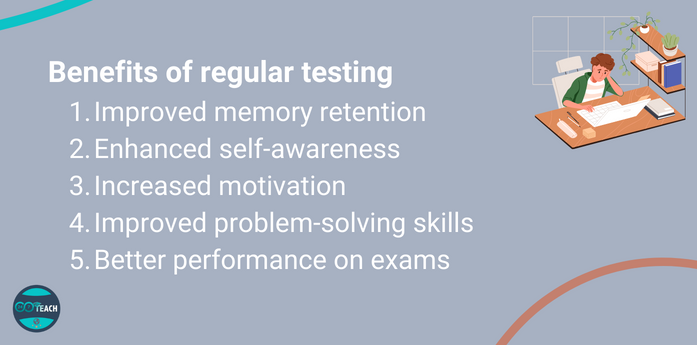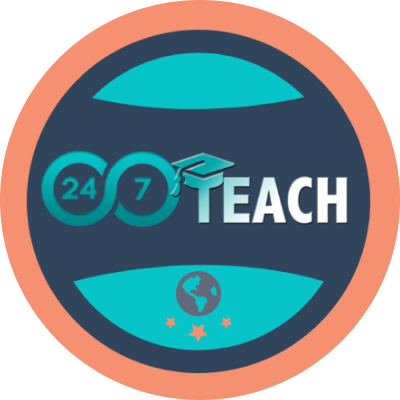Lesson 4: Quizzing or Retrieval Practice
Prefer to listen to this lesson? Click below:
Workshop Scenario:
Please think of yourself in the following scenario as you complete this workshop.
Imagine you are a learner struggling to keep up with coursework. You are overwhelmed by the amount of material you need to learn and find yourself forgetting key concepts and details. Determined to improve your study habits, you enroll in a learning and studying techniques workshop. In that workshop, you learn about several excellent study techniques.
Your final assignment is to choose a study technique to research and prepare to debate why you think that study technique is the best. Also, provide an example of how you used the study technique in your own life.
In the last lesson, you learned about the interleaving study technique.
In this lesson, you will learn about retrieval practice.
Remember to take notes on the pros and cons of retrieval practice. You will need to choose one of the study routines to debate later.
Learning Objectives
By the end of this lesson, learners will be able to…
Understand the definition of quizzing and retrieval practice
Explain the benefits of quizzing and retrieval practice for long-term memory
Create a personalized study routine by applying these two study techniques
Important Questions to Answer While Reading
To be successful in this lesson, you must be able to answer these important questions.
What is quizzing or retrieval practice?
What are some ways to incorporate retrieval practice into your study routine?
Lesson 4: Quizzing or Retrieval Practice
What is quizzing or retrieval practice?
Quizzing, also known as retrieval practice, is a learning technique that involves recalling information from memory, typically through questions or practice tests. Retrieval practice is based on the idea that actively recalling information from memory helps to strengthen and reinforce memory traces, leading to improved retention of information over time.
Benefits of regular testing
Improved memory retention: Improved memory retention refers to the ability to better store and retrieve information from memory over time. This is an essential outcome of effective learning and is often a goal of using study techniques and strategies. By using techniques like active recall, chunking, mnemonic devices, and others, learners can strengthen the neural connections in their brains, leading to more efficient and effective memory storage and retrieval. Improved memory retention can lead to better exam performance, enhanced problem-solving skills, and increased confidence in one's abilities.
Enhanced self-awareness: Retrieval practice or quizzing can enhance self-awareness by highlighting areas where learners may need to improve their understanding or knowledge. When learners attempt to retrieve information from memory, they may discover gaps in their ability or understanding that they were previously unaware of. This can help them to identify areas where they need to focus their study efforts and improve their overall learning outcomes. Additionally, by practicing self-quizzing or using other retrieval techniques, learners can better understand what they know and don't know, which can help them set more realistic goals and expectations for their learning.
Increased motivation: Retrieval practice, or quizzing, can increase motivation for some learners. When students engage in retrieval practice, they receive feedback on what they know and what they still need to learn. This can help to motivate them to continue studying and working to improve their understanding of the material. Additionally, incorporating growth mindset principles, such as viewing mistakes as opportunities for learning and embracing challenges, can help to increase motivation and foster a love of learning.
Improved problem-solving skills: Retrieval practice and interleaving are two study techniques that enhance problem-solving skills. Retrieval practice strengthens memory recall, making retrieving and applying the information to new situations easier. Interleaving promotes flexible thinking and helps learners better understand how different concepts or skills relate to each other, which can enhance problem-solving skills for complex or unfamiliar problems. Additionally, choosing a growth mindset can help learners view challenges and obstacles as opportunities for learning and growth, leading to more effective problem-solving approaches.
Better performance on exams: Regular testing through quizzing or retrieval practice has improved performance on exams. When information is actively retrieved from memory, it is more likely to be retained over time, which can help to better prepare for exams. Additionally, practicing problem-solving skills through techniques such as interleaving and active recall can enhance the ability to apply knowledge in new and unfamiliar situations, which can be especially valuable on exams where unexpected or challenging questions may be presented.
Ways to incorporate retrieval practice into your study routine
Self-quizzing: Self-quizzing is a retrieval practice technique where you ask yourself questions about a particular topic, attempting to recall the information from memory without looking at any notes or resources. This technique helps to strengthen and reinforce memory traces, leading to improved retention of information over time. Self-quizzing can be done using flashcards or simply asking yourself questions about the material you have studied.
Flashcards: Flashcards are a study tool to enhance learning and memory retention. They usually consist of a question or prompt on one side of the card and the corresponding answer on the other. Flashcards can be used to practice a wide range of subjects, from vocabulary to mathematical formulas, and can be an effective method for learning and memorizing information through active recall. Creating flashcards can also be helpful, as it involves summarizing and synthesizing information and identifying key concepts and details.
Practice exams: Practice exams are a form of retrieval practice that can help students prepare for exams by testing their knowledge and understanding of a particular subject or topic. Students or instructors can create practice exams. By taking practice exams, students can identify areas where they need to improve their knowledge or skills and become familiar with the format and style of questions they may encounter on the exam. This can help to reduce test anxiety and improve performance on the exam. Additionally, practice exams can reinforce the concepts and information learned through other study techniques, such as active recall and mnemonics.
Peer Review: Peer review is a technique in which you have a study group or a partner with whom you can discuss and review the materials you are studying. You can ask each other questions, share knowledge, and provide feedback, which can help you identify gaps in your understanding and clarify concepts. Peer review can also help develop critical thinking and problem-solving skills and provide a supportive learning environment.
Closing Assessment:
Now that you have reached the end of this lesson, you should know the following:
Understand the benefits of regular testing, retrieval practice and tools or techniques can be used for self-quizzing or practice testing.
Advance your understanding:
Please answer the following questions in the comment section below and interact with learners from around the world.
How can retrieval be used to promote long-term retention of information compared to other learning techniques?
Please read and reply to other learners’ answers in the forum by stating if you agree or disagree with their answers and why. Your replies should offer new substantiated ideas or thoughtful questions.









